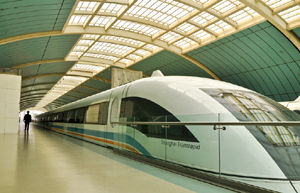In the past couple of months, the Chinese government has gradually strengthened the so-called "mini-stimulus" - policies supporting growth. While re-iterating its willingness to tolerate slower growth and reluctance to use strong and short-term measures, the government has increased railway investment, accelerated approvals and construction plans on other infrastructure projects, including water and utilities, and quickened construction and fund disbursement for shanty town renovations. We estimate that these measures together would amount to about 0.6 percent of GDP, assuming the increases relative to 2013 are all new.
The intensifying of the mini-stimulus measures reflects the authorities' commitment to protecting the "lower bound" of the growth target, believed to be 7-7.5 percent for 2014 so that the target on new job creation (10 million for 2014) can be achieved, and other issues in the economy can be dealt within a stable macro environment.
In line with this general government stance, the central bank has quietly eased liquidity conditions in the past 2-3 months as well. As a result, both short-term interbank rates and long-dated bond yields have remained low relative to the beginning of the year. While the People's Bank of China is reluctant to use RRR cut to send a strong signal, it has quietly used open market operations, on-lending facilities and un-sterilized FX interventions to deliver more liquidity. In addition, the central bank has used moral situation to budge banks speed up mortgage approvals and keep rates "reasonable".
As these measures start to take effect and as export growth recovers in the coming months, we may see growth momentum stabilizing and improving in the summer months. However, ongoing property sector weakness is expected to weigh on construction and heavy industrial production throughout this year, with the negative second round impact increasing later in the year and into 2015.
We think the government is very aware of the downside risk to growth and is prepared to increase policy support if necessary. In his latest field trip, Premier Li Keqiang pointed out that "the economy still faces large downward pressures" and "all levels of governments should place development as the top priority", and promised to "fine tune macro policies in an appropriate and timely way, to ensure a stable growth of money and credit".
As such, we expect the government to relax policies further, including policies directly related to property, as property and economic activities weaken further later on. Such policies could include relaxation of HPR and hukou, reduction in down payment requirement, and relaxation in credit.
In addition, the government could further speed up the disbursement of fiscal budget expenditure to support the construction of key infrastructure projects. Growth-friendly reforms will also be accelerated, including opening up service and utilities to private investment.
Article is co-authored by UBS economists Wang Tao, Donna Kwok, Harrison Hu and Ning Zhang. The views do not necessarily reflect those of China Daily.
|
 |
 |
| Top 10 high-speed trains in the world | Pack like a luggage bag, but drive like a motorcycle |
